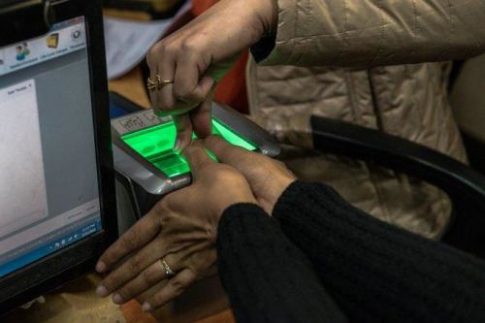…and after that comes the RFID microchip!
– India’s Big Brother: Fingerprint And Eye-Scans Required For Food And Medicine:
India collects biometric data on 1.3 billion residents for use in a nationwide identity system called Aadhaar.
The New York Times notes Big Brother has Arrived in India.
Seeking to build an identification system of unprecedented scope, India is scanning the fingerprints, eyes and faces of its 1.3 billion residents and connecting the data to everything from welfare benefits to mobile phones.
Civil libertarians are horrified, viewing the program, called Aadhaar, as Orwell’s Big Brother brought to life. To the government, it’s more like “big brother,” a term of endearment used by many Indians to address a stranger when asking for help.
Prime Minister Narendra Modi and other champions of the program say that Aadhaar is India’s ticket to the future, a universal, easy-to-use ID that will reduce this country’s endemic corruption and help bring even the most illiterate into the digital age.
The poor must scan their fingerprints at the ration shop to get their government allocations of rice. Retirees must do the same to get their pensions. Middle-school students cannot enter the water department’s annual painting contest until they submit their identification.
The Modi government has also ordered Indians to link their IDs to their cellphone and bank accounts.
Although the system’s core fingerprint, iris and face database appears to have remained secure, at least 210 government websites have leaked other personal data — such as name, birth date, address, parents’ names, bank account number and Aadhaar number — for millions of Indians. Some of that data is still available with a simple Google search.
As Aadhaar has become mandatory for government benefits, parts of rural India have struggled with the internet connections necessary to make Aadhaar work. After a lifetime of manual labor, many Indians also have no readable prints, making authentication difficult. One recent study found that 20 percent of the households in Jharkand state had failed to get their food rations under Aadhaar-based verification — five times the failure rate of ration cards.
Does anyone see this system as a benefit for the people?
As one commenter notes:
Aadhaar, which was envisaged as a tool to ensure welfare reaches the right person (Indian system had immense leakages including corruption and pilferage and thus made sense in some ways) has now been turned into a surveillance tool by the BJP by making it mandatory to link it to bank accounts, mobile phone, driving license, buying property etc. (literally linking it to anything). A few activists have taken it to courts and the verdict is awaited. In a way press is also putting up a fight on this issue. How this will play out remains to be soon.
How things will pan out depends on the results of the general elections. IMO, BJP is still the strongest party and their twin heads – Modi, a great orator (probably better than Obama – like the US citizens in 2008 got fooled by the change we can believe in, Indians also get fooled) and Amit Shah, a great organiser – have the ability to pull it off. Hopefully it will not come to pass as without proper checks and balance in a porous democracy like India democracy can be easily transformed into a tyranny. Even now in many ways it is the Tyranny of the majority.
As The New York Times notes, opponents have filed at least 30 cases against the program in India’s Supreme Court. They argue that Aadhaar violates India’s Constitution – and, in particular, a unanimous court decision last year that declared for the first time that Indians had a fundamental right to privacy.
Rahul Narayan, one of the lawyers challenging the system, said the government was essentially building one giant database on its citizens. “There has been a sort of mission creep to it all along,” he said.
* * *
PayPal: Donate in USD
PayPal: Donate in EUR
PayPal: Donate in GBP
